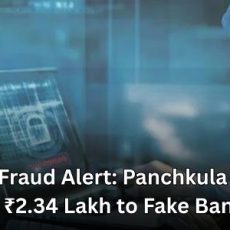Introduction
A 27-year-old software engineer from Sector-15 has fallen prey to a sophisticated cyber fraud, losing ₹2.34 lakh. The cybercrime police have registered a case under Sections 316(2) and 318(4) of the Bharatiya Nyaya Sanhita (BNS) following a complaint filed by the victim, Divya Sharma. According to the complaint, Sharma received a phone call on April 17 around 3pm from an individual claiming to be a representative of ICICI Bank. The caller informed her that a “credit card protection plan” had been activated on her card, incurring a monthly charge of ₹2,499. GetMyIndia.com
How the Fraud Was Carried Out
The Panchkula-based software engineer received a phone call from a person posing as a representative of his bank’s credit card department. The caller claimed that there had been suspicious activity on his credit card and warned that urgent action was needed to secure the account. Gaining the victim’s trust, the fraudster convinced him to share sensitive card details under the guise of verification.
Once the information was handed over, the fraudster swiftly initiated a series of unauthorized transactions, amounting to ₹2.34 lakh. The victim only realized the scam after noticing multiple charges on his account. Despite his technical background, the engineer fell victim to the scam due to the caller’s convincing and urgent tone, a common tactic in phishing and social engineering frauds.
Immediate Action Taken by the Victim
As soon as the software engineer discovered the unauthorized transactions on his credit card, he acted quickly. He immediately contacted his bank to report the fraud and requested that his credit card be blocked to prevent further misuse. Following this, he approached the Panchkula Cyber Crime Police Station and filed a formal complaint. An FIR was registered under relevant sections dealing with cheating and cyber fraud. The swift reporting enabled authorities to begin an investigation without delay, increasing the chances of tracing the fraudster and possibly recovering the lost funds.
Police Investigation Underway
Following the victim’s complaint, the Panchkula Cyber Crime Police registered an FIR and launched an investigation into the credit card fraud. Authorities are currently working to trace the phone number used by the fraudster and are analyzing transaction records to track the flow of funds. Investigators suspect that the caller may be part of a larger cybercrime syndicate targeting individuals under the pretense of bank verification. The police are also collaborating with the bank and relevant digital payment platforms to gather technical evidence, including IP addresses and account details linked to the fraudulent transactions. Efforts are ongoing to identify the culprit and prevent similar scams in the future.
Cybersecurity Tips to Prevent Similar Frauds
- Never Share Confidential Information
Do not disclose your OTPs, CVV, PINs, or card numbers to anyone over the phone, SMS, or email, even if they claim to be from your bank.
- Verify Caller Identity
Always hang up and call your bank’s official customer service number if someone contacts you about suspicious activity or verification.
- Enable Transaction Alerts
Activate SMS and email alerts for every transaction to monitor your account in real time.
- Use Strong Passwords and Two-Factor Authentication
Strengthen your online banking and payment accounts with strong passwords and enable two-factor authentication (2FA) wherever possible.
- Avoid Clicking on Suspicious Links
Do not click on links sent via unsolicited messages or emails, as these could lead to phishing sites designed to steal your information.
- Regularly Check Account Statements
Frequently review your credit card and bank account statements to catch and report unauthorized transactions promptly.
- Report Fraud Immediately
If you suspect any fraudulent activity, inform your bank and file a complaint with the nearest cybercrime police station without delay.
- Stay Updated on New Scams
Follow trusted cybersecurity sources or government advisories to stay informed about emerging fraud tactics.
Authorities Urge Public to Stay Vigilant
In light of the recent fraud case involving the Panchkula software engineer, local authorities and cybercrime officials have issued a strong advisory urging the public to remain alert. They emphasized that no legitimate bank or financial institution will ever ask for sensitive details like OTPs, CVV numbers, or passwords over the phone.
Citizens are encouraged to be cautious when receiving unexpected calls or messages claiming to be from banks, and to independently verify such claims using official contact details. The police have also appealed to the public to report any suspicious activity or attempted fraud immediately, as timely action significantly improves the chances of catching the perpetrators. Awareness campaigns are being planned in the region to educate people on identifying and avoiding cyber fraud. Authorities stress that vigilance, awareness, and quick reporting are key to protecting oneself and others from falling prey to such scams.
Conclusion
The recent credit card fraud case in Panchkula is a stark reminder of the growing threat of cybercrime, even to those with technical backgrounds. Despite the victim’s expertise, the fraudster’s convincing tactics and urgency led to a significant financial loss. Authorities have acted swiftly to investigate the case, but the incident highlights the importance of staying vigilant and cautious when dealing with unsolicited calls or messages.
As cyber fraud tactics become more sophisticated, individuals must take proactive steps, such as verifying caller identities, enabling transaction alerts, and regularly monitoring account activity. The authorities’ advice to avoid sharing sensitive details and report suspicious activity immediately could help prevent similar incidents. By staying informed and following cybersecurity best practices, individuals can better protect themselves from falling victim to such scams, ensuring their financial security in an increasingly digital world.
Gmicapitals.com RaysVeda.com GetMyStartup.com LawCanal.com ABHAYRAY.COM ZinCob.com




